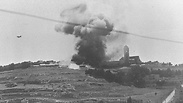
Arab leaders did plan to eliminate Israel in Six-Day War
Op-ed: During the 1967 war, Israel seized Egyptian and Jordanian operational documents with clear orders to annihilate the civil population. Nevertheless, different academics are distorting the facts in a bid to turn the Arabs into victims and Israel into an aggressor. Here’s the real story.
It’s true that he made threats. It’s true that he sent more and more divisions to Sinai. It’s true that he expelled the United Nations observers. It’s true that he incited the masses in Arab countries. It’s true that the Arab regimes rattled their sabers and prepared for war. It’s true that he closed the Straits of Tiran. It’s true that Israel was besieged from its southern side. It’s true that this was a serious violation of international law. It’s true that it was a “casus belli” (a case of war).

All that doesn’t matter, however, because there is a mega-narrative that obligates the forces of progress to exempt the Arabs from responsibility and point the accusing finger at Israel. And when there is a narrative, who needs facts? After all, according to the mega-narrative, Israel had expansionist plans, so it seized the opportunity. Different scholars are distorting the facts in a bid to turn the Arabs into victims and Israel into an aggressor.
Excuse us for winning
I was a child, an elementary school student. I remember fear, a lot of fear. There were no shelters in the house I lived in. It was clear that there would be bombings, so we dug pits in the yard.
Occasionally, we are reminded of the sound of thunder from Cairo to remind us of the annihilation threats. But in fact, they were much more serious. Both the Arab League and the leaders of all neighboring states announced in an unequivocal manner that the plan was annihilation. I repeat: Annihilation. Arrogant talk? Considering the fact that the Arab and Muslim world was engaged in endless self and mutual massacres, it was pretty clear that what they were doing to themselves—and it’s still going on—they would also do to Israel.
We must remember one thing, therefore: The alternative to victory was annihilation. So excuse us for winning. Because an occupation without an annihilation is preferable to an annihilation without an occupation.
‘Our goal is clear: To wipe Israel off the map’
The Arab states never accepted the State of Israel’s existence, not for a moment. There was no occupation from 1949 to 1967, but a Palestinian state wasn’t established, because the leaders of the Arab world didn’t want another state. They wanted Israel. They didn’t hide their intentions for a minute.
The new stage began in 1964. On the backdrop of a conflict over the water sources, the Arab League convened in Cairo and announced: “... collective Arab military preparations, when they are completed, will constitute the ultimate practical means for the final liquidation of Israel.”
Two years went by, and then-defense minister Hafez Assad, who went on to become Syria's president, declared: "Strike the enemy’s settlements, turn them into dust, pave the Arab roads with the skulls of Jews.” And to erase any doubt, he added: "We are determined to saturate this earth with your (Israeli) blood, to throw you into the sea.”
Nine days before the war broke out, Nasser said: “The Arab people want to fight. Our basic aim is the destruction of the State of Israel.” Two more days passed before Iraq’s president, Abdul Rahman Arif, joined the threats: “This is our chance…our goal is clear: To wipe Israel off the map.”
Two days before the war broke out, PLO founder and leader Ahmad Shukieri said: “Whoever survives will stay in Palestine, but in my opinion, no one will remain alive.” Yes, that was the atmosphere. Does anyone still seriously think that those were just declarations? Does anyone think that their intention was an enlightened occupation? Does anyone think that there would not have been a mass slaughter like the one Egypt carried out in Yemen and later on in Biafra?
Hussein: No annihilation orders, 'as far as I know'
In order to understand that these were not false statements, it should be noted that in a meeting held after the war between Israel’s Ambassador to London Aharon Remez and British Foreign Secretary George Brown, Remez said that Israel had seized documents of the Jordanian army on operational orders, from May 25 and 26, about two weeks before the war's outbreak, which included orders to exterminate the civil population in the communities that were planned to be occupied as well. They believed at the time that it was indeed going to happen.
It isn’t clear, Remez said at the time, whether Hussein was aware of these orders, but they were very similar to the annihilation orders issued by the Egyptian army. This appears both in Michael Oren’s book about the Six-Day war and in Miriam Joyce’s book about Hussein’s relations with the United States and Britain, as well as in Dr. Moshe Elad’s book (“Core Issues in the Israeli-Palestinian conflict”). At first, Hussein rejected the claims about the annihilation orders out of hand, but later added: “As far as I know.”
Clear and simple facts
The days passed. The threats increased. More and more forces were sent to Sinai. More Arab countries joined the war coalition. It’s unclear whether Nasser really wanted a war, Oren wrote in his book. But he and the Arab countries did everything in their power to deteriorate the situation. Nasser’s appetite kept growing, and immediately after blocking the straits, he declared: “If we managed to restore the conditions that existed before 1956 (the Straits of Tiran are blocked), God will surely help us and urge us to restore the situation that existed in 1948.”
The late Yitzhak Rabin, who served as IDF chief of staff at the time, told the government that “it will be a difficult war… There will be many losses.” He estimated that 50,000 people would be killed. And Oren, who had read almost every document that had been declassified, concluded: “The documentation shows that Israel wanted to prevent a war with all its might, and that up to the eve of the battles it tried to stop the war in every possible way—even at a heavy strategic and economic cost for the state.” These are the facts. But those who rewrite history are winning.
The political debate over the Israeli control of the territories has led to a situation in which political opinions disrupt the factual research. The political debate is important. It’s certainly legitimate. But there is no need to rewrite history to justify a political stance. It should be the other way around: Facts should influence political views. And the facts are clear and simple: The Arab states’ leaders did not only settle for declarations on an expected annihilation, they even prepared operational orders.











